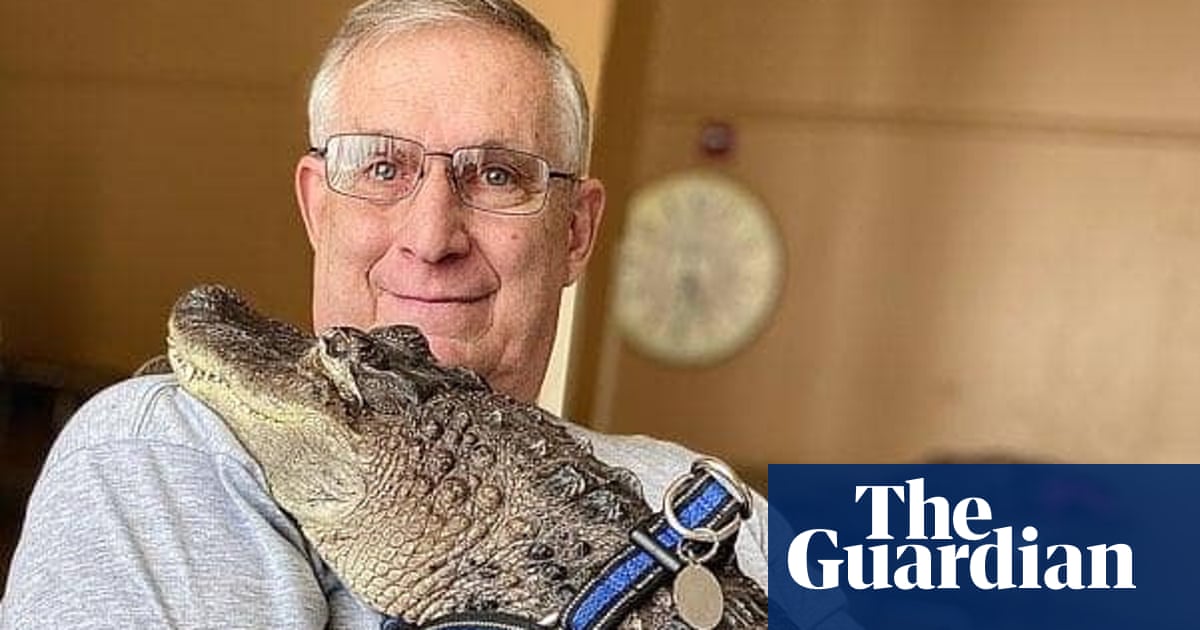- September 11, 2022
- No Comment
- 5 minutes read
How an alligator became an emotional support animal: ‘They said it was a midlife crisis’ – The Guardian

Joseph Henney’s main companion is not an ordinary alligator. ‘He tries to comfort people and is famous for his hugs’
Joseph Henney, 69, grew up on a farm in the same area of Dover, Pennsylvania he lives in now. From a young age, Henney was surrounded by a wide range of animals, such as cattle, coyotes, snakes and hogs, which makes owning a pet alligator perhaps the least surprising thing about him.
But Henney’s gator companion Wally is not an ordinary pet – he’s an official emotional support animal and one that is now somewhat famous after video of Henney and Wally walking together in Philadelphia’s Love Park went viral and triggered a slew of news headlines.
The story of how the pair came together is a remarkable one.
Five years ago, Henney was depressed and lonely after some of his closest friends and family members died around the same time. A fellow animal-rescuer friend in Florida brought a baby alligator, then just 20in long, to Henney. Soon, he was the proud new owner of a pet alligator, lovingly named Wally.
“I lost three family members and four lifelong friends in two weeks. I shut down in a big, deep depression,” Henney said. “My doctor wanted to give me anti-depression medicine and I wouldn’t take it. So I went back in a month for another evaluation with my doctor. And he said, ‘What are you doing, Joe? You’re doing pretty good.’
“I said, ‘I’m hanging out with my alligator.’”
Henney told stories about how he played hide and seek with Wally, and how Wally would often play with Henney by pulling his blanket off him or taking his pillow. He explained to his doctor that, “[Wally] does things alligators do not do.”.
“He is constantly with me, constantly keeping my attention, and making me laugh. We found that he does sense people’s emotions, and he tries to comfort them. He is famous for his hugs. People come from all over the world to get a hug.”
To Henney’s surprise, his doctor was happy to help him register Wally as an emotional support animal – a designation he will have to request for renewal each year. (Wally is a 5.5ft-long alligator, after all.)
“I said, ‘Doc, you’ve lost your marbles.’”
But so far, there has been no problem with the astonishing situation.
Before Wally, Henney made his living with animals, too. He proudly reminisced about his bull-riding days in his late-teens and early twenties that led him to travel across the country to places like Calgary, Canada and the Houston rodeo in Texas.
“I had bulls when I was like, 11 years old. I actually rode in professional rodeos when I was younger. My son was born in Houston.”
In addition to building houses and furniture, Henney also worked at wildlife sanctuaries and as time went on, he fostered animals in his own home until a sanctuary, park or zoo was ready to care for them. And while most people might choose to foster cats or dogs, Henney fostered reptiles such as iguanas, rattlesnakes, cobras, komodo dragons and alligators – all within the comfort of his living room.
But Wally is different, he insists. He is no ordinary gator.
“He doesn’t bite,” he said. “He refuses to bite everything alive. We do not know why.”
It’s unclear if the “we” he is referring to is himself and other humans, or Wally.
At first, Henney said people he knew expressed hesitation about owning a pet alligator. Some tried to talk him out of the idea altogether.
“They told me it was a midlife crisis.”
But people in Henney’s circle were quick to change their tune. Henney now introduces students in schools and kids in camps to Wally, educating them about reptiles. Henney’s best friend, Mary Johnson, recently nominated Wally for the America’s Favorite Pet award. He’s hoping he wins.
But regardless of the competition’s results, Henney has big plans for adventures with Wally. While he says alligators probably aren’t suitable for traveling on planes, as many other emotional support animals do.
“We’re willing to travel. I mean, there are ships, there are trains. We can drive. We can do it all,” he said.

